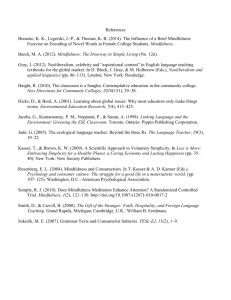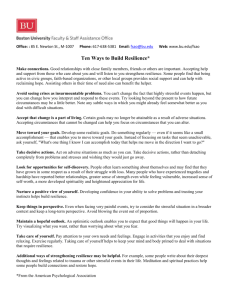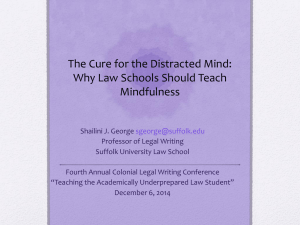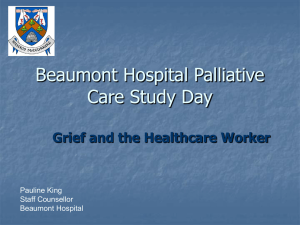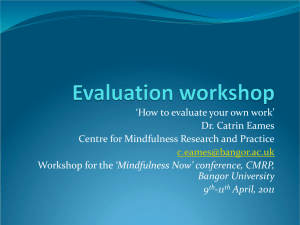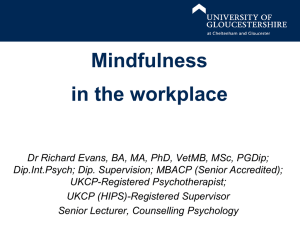Tackling Youth Depression through the use of Mindfulness, Strength
advertisement
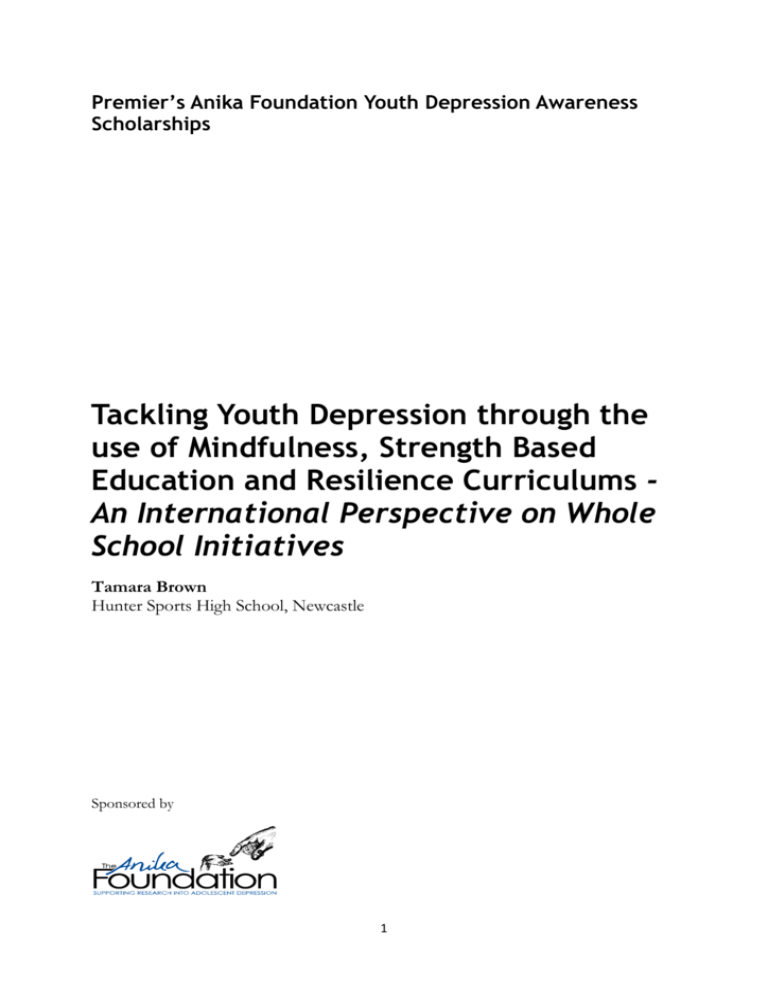
Premier’s Anika Foundation Youth Depression Awareness Scholarships Tackling Youth Depression through the use of Mindfulness, Strength Based Education and Resilience Curriculums An International Perspective on Whole School Initiatives Tamara Brown Hunter Sports High School, Newcastle Sponsored by 1 Introduction The significant rise in adolescent depression and related mood disorders in Australia is cause for serious concern. Depression is the highest ranked cause of non-fatal disability in Australia, with approximately twenty per cent of adolescents experiencing a depressive state in any given year. In the last 50 years, suicide rates among youths aged between 15-24 have tripled (Cutler, Edward, Glaeser & Norberg, 2001). As a school counsellor, working with young people in both primary and secondary school settings, a key priority is the improvement of students’ mental health through early intervention and prevention strategies. I had the privilege of being awarded the Premier’s Anika Foundation Youth Depression and Awareness Scholarship in 2011. The Anika Foundation raises funds to research and prevent youth depression and suicide. The scholarship enabled me to explore youth mental health and learn from international approaches and strategies to curb the alarming statistic of youth depression. There is a growing need to establish and implement whole school programs that promote wellbeing and resilience to prevent depression from occurring in the first place Focus of Study This study focused on the use of the Mindfulness Based Cognitive Therapy, Positive Psychology, and Strengths Based Education and Resilience Curriculum Programs, as proactive initiatives for the prevention of child and adolescent depression in Australia. Such programs are currently being implemented in some schools in North Wales, England and America. This tour allowed me to participate and complete training in schools and universities across the United Kingdom and the United States to research, develop and implement practical psychological interventions to enhance students resilience, thereby reducing the likelihood of depression occurring. Through the awarding of this scholarship I was able to work with world leading experts, renowned psychologists, and authors, immersing me in the learning and principles of strength based schools and mindfulness. Significant Learning The Importance of Finding and Focusing on our Strengths Maccessfield, Cheshire, England The study tour began with a meeting with Jenny Fox Eades in the small country town called Bollington. Jenny Fox Eades is the Program Director for Schools and Young People for the Centre of Positive Psychology and author of Listening to Life (Quay Press, 2004), Classroom Tales (Jessica Kinglsey) and most recently Celebrating Strengths (Capp Press, 2008). Jenny’s teachings focus on the facilitation of ways for people to find and develop their strengths. She runs Celebrating Strengths workshops in schools and with professionals designed to focus on character strengths, to develop wellbeing and to build strength based educational cultures. The tenets of Jenny’s work are based on the premise of positive psychology, a relatively recent field of psychology championed by the US psychologist Martin Seligman. The work of positive psychology and Jenny’s Celebrating Strengths programs are showing the benefits of focusing on human wellbeing and strengths. Studies are now showing that focusing on the positive aspects of the one’s life can 2 have a significant effect on reducing depression and increasing happiness and resilience (Seligman, 2011). Jenny uses positive psychology to teach individuals and schools the importance of building positive habits of thought, speech and behavior. Jenny asserts that as humans we get more of what we focus on, for example if we were to habitually focus on a child’s weakness, we will fail to help the child flourish. If instead with focus on their strengths, teachers can find and help students develop their strengths further. Finding student’s strengths and giving them ample opportunity to use their strengths, is a key ingredient in creating flourishing children, and competent capable successful and happy adults. I had the privilege of attending Bollington Cross Church of England School, to participate in a ‘Working with Character Strengths and Virtues’ workshop facilitated by Jenny Fox Eades. Bollington Cross School is one of several Celebrating Strengths Based Schools in England. In attending a Celebrating Strengths School, what became immediately apparent was the students capacity to articulate their understanding of both their own and others strengths. I also had the opportunity to interview the Principal to gauge the impact of this program from a leadership perspective and she indicated an increase in students’ emotional intelligence. The Principal commented that as students love identifying and focusing on their strengths which in turn has increased their emotional intelligence dramatically and has resulted in a more harmonious learning environment as evidenced by less reports of student depression, greater connections between staff and students and less instances of bullying and harassment in both the playground and the classroom. Celebrating strengths uses positive psychology to build a community, and unites staff and students by focusing on what they can and will achieve. The Principal also spoke of how Celebrating Strengths has decreased a lot of children’s anxiety levels and increased their confidence. The Effectiveness of Mindfulness in schools The past is history, the future a mystery, but today is a gift- that is why they call it the present (Kung Fu Panda). I then travelled to the Centre of Mindfulness Research and Practice School of Psychology, Bangor, North Wales As a school counsellor, very often our role is counselling students with depression and anxiety. Research has shown the benefits of using Mindfulness in the prevention and treatment of depression in adults (Segal, Williams & Teasdale, 2002), so it stands to reason that similar benefits could be had with young people. This interest in Mindfulness led me to Bangor UniversityCentre for Mindfulness Research & Practice (CMRP), where I participated in a Mindfulness Based Stress Reduction Course. The CMRP and Bangor University are committed to the promotion of well-being through the application of mindfulness based approaches for children, adolescents and adults. The CMRP train professionals in the use of Mindfulness Cognitive Based Therapy as a treatment and prevention for depression. I attended a five-day residential retreat, where I participated in experiential learning of Mindfulness, learning the ways in which it can be delivered as therapy for children and adolescents and within the school environment. 3 What is Mindfulness? Mindfulness is paying attention to the here and now. It means paying attention in a particular way with purpose to the present moment and nonjudgmentally (Kabat-Zinn, 1996). Research shows that mindfulness can increase emotional regulation in students, enhance attention and working memory, increase self-esteem, help with conduct and management problems, and decrease depression and anxiety (Napoli, 2005). Mindfulness reconnects students to their five senses, bringing them into a moment-to-moment awareness of themselves and their surroundings. By increasing their awareness, we can teach students to respond with choice, rather than react automatically. Mindfulness teaches students to become ‘fully present’, which helps students to be more focused and better able to deal with stressful situations. I had the pleasure of being trained by Mindfulness expert Sarah Silverton who recently published a book called the Mindfulness Breakthrough - The Revolutionary approaches to Dealing with Stress, Anxiety and Depression. Sarah is currently researching the effectiveness of Mindfulness in schools, and is working in schools in North Wales teaching Mindfulness to students and teachers. Sarah said that she has seen firsthand, the positive effects of mindfulness in the classroom, with calmer learning environments, and students showing more focus. Sarah believes that schools are a perfect place for the introduction of mindfulness techniques, not just in one to one counselling sessions, but could be incorporated in the classrooms throughout the day. For example, beginning the first session of the school day by bringing awareness to the present moment with a guided meditation or visualisation, which would help students begin the day freshly, with focused attention. Mindfulness could also be practiced before important events such as exams or competitions. The goal of mindfulness is for students to feel calm and focus their energy and attention. By teaching students to refocus, we can create a more productive and relaxed, less anxious and stressful learning environment, resulting in children benefitting psychologically and emotionally, as well as gaining a general sense of wellbeing. University of Cambridge, England I began this tour with the aim of researching practical therapeutic techniques to implement within schools which would enhance resilience and reduce depression levels in students. When researching program ideas around well-being in schools I discovered Doctor Nick Bayliss. Dr. Nick Bayliss, author of The Rough Guide to Happiness, created YoungliveUK.com and became the first British lecturer to develop a course in Positive Psychology and the Science of Wellbeing, launching his course at Cambridge University. Nick has developed school-based programs, which have been implemented in some of Britain’s best schools called ‘Applying the Skills of WellBeing’. Nick’s presentations in schools encourage exploration of principles, strategies, skills and experiences that can serve as a catalyst to live profoundly healthy, highly adventurous and goodhearted lives. He teaches students how they can best overcome fears, deal with setbacks, prevent depression and develop friendships. 4 I met Nick in Cambridge, where we discussed the science of well-being and how this can be taught and practiced in the school environment. Nick preaches three key tenets in enhancing well-being; these include Decompression, Relaxation and Rebalance. Decompression is a term used to deal with stresses or traumas experienced whether it be a recent or a long ago and enduring stress or trauma. Decompression is a technique used to deal with the pain of the occurrence of the stressful event. Physical activity is one of the best strategies for achieving decompression, whether it is running, breathing or even through benevolent touch i.e. peer massage. The theory of benevolent touch is “you can’t feel alone whilst being touched”. Currently many students are achieving decompression through physical activities such as violence or self harm; schools should be providing avenues to achieve decompression in safer and more productive ways. Nick suggests decompression can occur by singing. Schools with choirs or ‘Glee Clubs’ are enhancing positive well-being in their students by allowing for decompression to occur naturally. Singing is an activity that promotes togetherness. Nick believes children (and adults) should be taught the skill of relaxation, as this improves everything! (Bayliss, 2012). Relaxation techniques done at the beginning of lessons can help students ‘slow down’ and be ready for learning. The final lesson in helping students achieve optimal well-being is rebalancing. Rebalancing is the art of becoming refreshed and recuperated. Wellbeing can only be created in schools if students have had the opportunity to unwind. The better we can help our student’s rebalance, the further we can help them reach their potential both psychologically and academically. Resilience and Positive Education Programs in Schools Swarthmore College, Pennsylvania, USA The final stage of this study tour was a visit to the Positive Psychology Lab – Swarthmore College, Pennsylvania, USA. The Positive Psychology Lab conducts research on psychological well-being. Much of their work focuses on the development and evaluation of school-based interventions and curricula designed to promote resilience and well-being in children and adolescents. It was at Swarthmore College that I met Jane Gillham who is the Associate Professor and Co-Director of the Positive Psychology Project and Co-Director of The Penn Resiliency Project. Professor Jane Gillham's major research and clinical interests are at the intersection of clinical psychology, developmental psychology and education, particularly the ways in which schools can promote well-being in children and adolescents. Jane spoke to me about the inventions and programs currently being implemented in schools across America, which she has researched and developed. These include the Girls in Transition Project. The goal of the Girls in Transition Project is to develop and evaluate a curriculum that teaches resilience skills to early adolescent girls. In the Girls in Transition program, girls discuss peer and family relationships, achievement, body image, and ways of thinking and feeling about problems. They learn techniques for thinking more realistically about the problems they encounter and discuss ways of handling difficult situations. Specific problem-solving skills 5 including assertiveness, negotiation, and decision-making techniques are presented. Girls also discuss their goals and future aspirations. Another program Jane is involved in is the Positive Psychology for Youth Project. The goal of this project is to develop and evaluate a positive psychology curriculum for high school students. The High School Positive Psychology curriculum includes three main components. The first component focuses on increasing positive emotion. Positive emotion can be described as providing opportunities for increased attention to positive events in life, gratitude, mindfulness and savoring, and resilience training. The second, and largest, component focuses on helping students to identify their signature strengths and use these strengths more in their day-to-day lives. The third component focuses on meaning and purpose, and encourages students to think about the activities and experiences that increase meaning in their lives (Seligman, Revich, Gillham, Linkins, Peterson, Duckworth, Steen, & Schwartz, 2003). A third program developed at the positive psychology lab is the R4Power Project. The R4Power program teaches concepts and skills from the Penn Resiliency Program (PRP), a curriculum designed to promote resilience in early adolescence. The R4Power is an online program, which is designed to teach middle school aged children a variety of skills for handling stressful situations and circumstances that are common during adolescence. The most well-known and world-renowned curriculum program that Jane has been involved with in the development, implementation and research of teaching resilience to adolescents in schools is the Penn Resilience Program (PRP). The program curriculum teaches cognitive-behavioural and social problem-solving skills and is based in part on cognitive-behavioural theories of depression by Aaron Beck, Albert Ellis, and Martin Seligman. Through this model, students learn to detect inaccurate thoughts, to evaluate the accuracy of those thoughts, and to challenge negative beliefs by considering alternative interpretations. PRP teaches students techniques for assertiveness, negotiation, decision-making, and relaxation. The skills taught in the program can be applied to many contexts of life, including relationships with peers and family members as well as academics and general achievement. Conclusion The need to implement whole school programs and interventions to enhance resilience and wellbeing for students is imperative, as this is the key to preventing depression in young people. As schools, we have the opportunity to build lifelong skills and positive school climates and cultures that allow students to flourish and enhance their well-being. Through participating in this research I had opportunity to see firsthand the benefits of these programs, and research the latest successful practices from world leaders in principles of strength based schools and mindfulness from across the UK and US. This tour has allowed me to experience some of the best interventions that are able to be easily implemented in schools, which would promote greater personal well-being, hence increasing student’s ability to cope with adversity and prevent depression from occurring. In attending a Celebrating Strengths School, it was apparent the positive effect that the program was having on both the staff and students, evidenced by the student’s ability to articulate their understanding of both their strengths and 6 others strengths. As well as anecdotal evidence provided by school leaders on the reduced amount of bullying instances and a decrease in the need for counsellor referrals. This tour has highlighted the therapeutic benefits of mindfulness in schools as a pro-active measure to help students maintain a level of calmness and self-awareness. I believe that we should be giving students the opportunity in schools to use and have a greater understanding of their mind. Mindfulness lessons in schools can be used as a way to help students relax and be calm. There are the many other benefits of Mindfulness such as helping students cope with exam stress, get to sleep, manage anger, deal with difficult relationships, improve their performance in sports, or simply handle the increasingly stressful pace and pressure of adolescence. This tour has opened my mind to the vast number of ways in which a School Counsellor can have a dramatic effect on the outcomes for young people in schools in a more positive and strength based environment it has given me the confidence to go out and make a difference beginning with my current school, Hunter Sports High School, where I will build an awareness of and appreciation for alternate methods that can be easily implemented in schools. This scholarship has given me the knowledge that will allow me to facilitate learning about youth mental health and ways that schools can form communities to promote a better understanding and response to adolescent depression. As a result of this study I will use the knowledge I have gained to develop and implement a culture within my Community of Schools to focus on ways in which we can use our individual strengths each and every day. I will do this in the same way that Jenny Fox Eades has, through the method of storytelling and celebrations of events and witnessing student’s use their individual strengths. I have also been given the opportunity to run student well-being and resilience programs within Hunter Sports High School, working with disengaged youths who have received numerous suspensions over the last year. Professor Nick Bayliss, has agreed to support such programs with his input, which will guide many aspects of this program I will also be conducting Mindfulness Training with interested staff members and hope to be able to introduce Mindfulness as an everyday occurrence across several schools, as the results do speak for themselves. Being a School Counsellor, means that a community of schools approach, for both Primary and Secondary schools in the Newcastle area is be possible as a means to implement best practice Resilience, Positive Education and Mindfulness initiatives currently being used in the USA and UK in order to prevent depression and increase resilience in young people. Once programs have been completed and evaluated for their effectiveness, they will be available by contacting the author. 7 References Bayliss, N. (2009) The Rough Guide to Happiness (Rough Guide Reference). Cutler, M, Edward L. Glaeser, Karen E. Norberg(2001). Explaining the Rise in Youth Suicide and Risky Behavior among Youths: An Economic Analysis, University of Chicago Press Fox Eades, J. (2008). Celebrating Strengths: Building Strengths-based Schools. UK: Capp Press. Fox Eades, J. (2006). Classroom Tales: Using Storytelling to Build Emotional, Social Across the Primary Curriculum. Kingsley And Academic Skills Napoli, M. (2005) Mindfulness Training for Elementary School Students: The Attention Academy, Journal of Applied School Psychology, 2005 Segal, Z., Teasdale, J., Williams, M. (2002). Mindfulness-Based Cognitive Therapy for Depression. New York: Guilford Press Publishers. Seligman, M. E. P. (2011). Flourish: A Visionary New Understanding of Happiness and Well-being. New York: Free Press. Seligman, M., Reivich, K., Gillham, J.E., Peterson, C., Linkins, M. Duckworth, A., Steen, T., Schwartz, B., Holt, M. & Geraghty, T. (2003). Positive Psychology Program for High School Students: Lessons for the Pleasant Life, the Good Life, and the Meaningful Life. University of Pennsylvania, SwarthmoreCollege, and Wallingford-Swarthmore School District. Silverton, S (2012) The Mindfulness Breakthrough: The Revolutionary Approach to Dealing with Stress, Anxiety and Depression, Wales, UK, Watkins Publishing. 8
